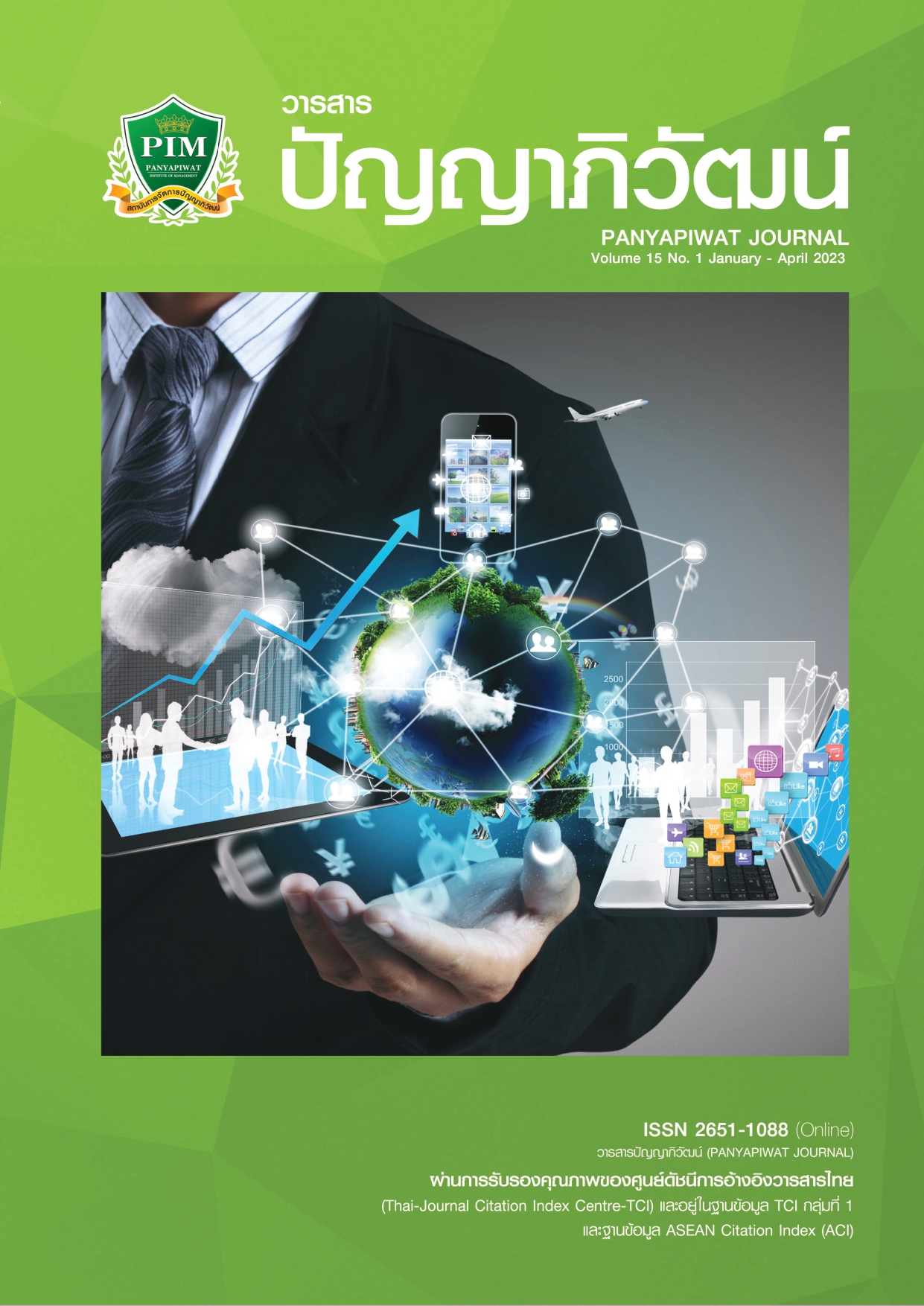ON CHINA’S NATIONAL CULTURAL SECURITY AND THE REVIVAL OF EXCELLENT TRADITIONAL CULTURE: A STUDY ON THE IMPORTANT DISCOURSE BETWEEN I CHING AND CHINESE CULTURE BY CHEN-NING YANG OF THE CHINESE ACADEMY OF SCIENCES
Main Article Content
บทคัดย่อ
There are a lot of disturbing factors in the process of China’s comprehensive revival of traditional excellent culture, and some scholars threaten China’s national cultural security by academic means. It is of great significance to maintaining national security if we can gain insight into the inherent logical structure of such scholars and their research methods which involve threatening the cultural security of the country. In his research, the author adopts the research methods of conceptual analysis, literature research, logical reasoning, and materialistic dialectics, selects Chen-Ning Yang, a member of the Chinese Academy of Sciences, as a case study, analyzes his method of argumentation, mode of thinking and logical structure accurately, discovers the objective defects in the research method applied by Chen-Ning Yang, and completes the logical evidence of his scientific view. This paper reveals and summarizes the theoretical methods of scholars that often use research hypotheses instead of research conclusions, false attribution, disregard and distortion of basic facts, misinterpretation, subjective speculation, and metaphysics.
Article Details

อนุญาตภายใต้เงื่อนไข Creative Commons Attribution-NonCommercial-NoDerivatives 4.0 International License.
“ข้าพเจ้าและผู้เขียนร่วม (ถ้ามี) ขอรับรองว่า บทความที่เสนอมานี้ยังไม่เคยได้รับการตีพิมพ์และไม่ได้อยู่ระหว่างกระบวนการพิจารณาลงตีพิมพ์ในวารสารหรือแหล่งเผยแพร่อื่นใด ข้าพเจ้าและผู้เขียนร่วมยอมรับหลักเกณฑ์การพิจารณาต้นฉบับ ทั้งยินยอมให้กองบรรณาธิการมีสิทธิ์พิจารณาและตรวจแก้ต้นฉบับได้ตามที่เห็นสมควร พร้อมนี้ขอมอบลิขสิทธิ์บทความที่ได้รับการตีพิมพ์ให้แก่สถาบันการจัดการปัญญาภิวัฒน์หากมีการฟ้องร้องเรื่องการละเมิดลิขสิทธิ์เกี่ยวกับภาพ กราฟ ข้อความส่วนใดส่วนหนึ่งและ/หรือข้อคิดเห็นที่ปรากฏในบทความข้าพเจ้าและผู้เขียนร่วมยินยอมรับผิดชอบแต่เพียงฝ่ายเดียว”
เอกสารอ้างอิง
doc. (2017). I ching and digital image processing. http://www.360doc.com/content/17/0911/12/41444550_686208043.shtml [in Chinese]
Chen, J., & Zhang, Z. (2016). Determination of ancient stir-fried steel based on slag analysis. The Southern Cultural Relics, (1), 115-121. [in Chinese]
China Daily. (2018). Chinese medicine will be included in the WHO global medical outline for the first time! http://world.chinadaily.com.cn/wykzg/2018-09/30/content_37010959.htm [in Chinese]
Hai, Y. (2018). Netizens launch White House petition to close Confucius Institutes in the U.S.. VOA Chinese. https://www.voachinese.com/a/news-blogger-starts-white-house-petitionon-confucius-institutes-20180221/4263900.html [in Chinese]
Han, Q. (2014). The metaphysical track of Western philosophy and the Chinese history of Western philosophy. Journal of Huazhong Normal University (Humanities and Social Sciences), (53), 60-64. [in Chinese]
He, Z. (2004). He Zuoxiu: The introspection on the “I Ching”. China Merchants Magazine, (45), 51. [in Chinese]
Hollister, R., Tecosky, K., Watkins, M., & Wolpert, C. (2021). Why every executive should be focusing on culture change now. MIT. https://sloanreview.mit.edu/article/why-every-executiveshould-be-focusing-on-culture-change-now/
Huazhong Agricultural University. (2015). Chinese pharmacologist Tu You has won the noble prize in Physiology or medicine. http://www.hzau.edu.cn/mks/info/1007/1916.htm [in Chinese]
Libniz, G. W. (1703). Explanation of binary arithmetic, which uses only the characters 0 and 1, with some remarks on its usefulness, and on the light it throws on the ancient Chinese figures of Fuxi. http://www.leibniz-translations.com/binary.htm
Liu, H. (2013). A concise text of Marxism: Materialistic dialectic theory. Jilin Publishing Group.
Lu, X. (1933). The pros and cons of electric. Shun Pao, Free Talk Edition. [in Chinese]
Needham, J., Wang, L., & Robinson, K. (1989). Science and civilization in China. Cambridge University Press.
Ouyang, K. (2012). Research on Marxist epistemology. Beijing Normal University Press. [in Chinese]
Spangenburg, R., & Moser, D. K. (2014). The history of science. Peking university press. [in Chinese]
The National People’s Congress of the People’s Republic of China. (2015). National security law of the people’s Republic of China. http://www.npc.gov.cn/englishnpc/lawsoftheprc/list.shtml
The National People’s Congress of the People’s Republic of China. (2018). National security law of the People’s Republic of China. http://www.npc.gov.cn/englishnpc/lawsoftheprc/list.shtml
Viswanatha, A. (2018). The US department of justice requires two Chinese large official media to register for foreign agents. WSJ. https://cn.wsj.com/articles/CN-BGH-20180919072236 [in Chinese]
Wang, D. (2014). A complete explanation of I Ching. Sichuan University Publishing. [in Chinese]
Wu, Y. (2016). The Chinese academy of Sciences has released 88 major ancient scientific and technological achievements. People’s Daily Overseas Edition. [in Chinese]
Xi, J. (2018). If you want a tree to grow tall, you must make its roots strong. People’s Daily overseas edition. [in Chinese]
Xia, Z., & Chen, Z. L. (2009). Ci Hai (6th ed.). Shanghai Dictionary Publishing. [in Chinese]
Xin, H. (2018). The heroic martyrs, protection law of the People’s Republic of China. Xinhua Net. http://www.xinhuanet.com/politics/201804/28/c_1122755588 [in Chinese]
Xue, S. (2009). China is the originator of drilling in the world. Guangming Online. https://www.gmw.cn/01gmrb/2009-12/30/content_1030164.htm
Yang, Z. (2004). The influence of the I Ching on Chinese culture. Chinese Journal of Nature, 27(1), 1-3. [in Chinese]
Zhang, A. (2014). Consideration of the basic issues of national cultural security. Journal of University of South China (Social Science Edition), (15), 30-34. [in Chinese]
Zhang, L. (2017). Overall national security concept and “common security”. Xinhua Net. http://www.xinhuanet.com/globe/2017-11/07/c_136717155.htm
Zhang, X., & Lao, C. (2011). How to safeguard national cultural security? Shandong University. https://xinwen.wh.sdu.edu.cn/info/1014/1991.htm [in Chinese]
Zhao, D. (1990). Dictionary of Chinese economic history. Hubei Dictionary Publishing House. [in Chinese]


